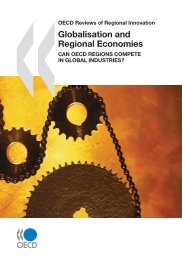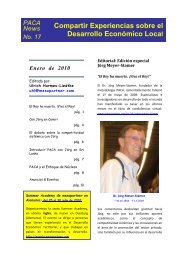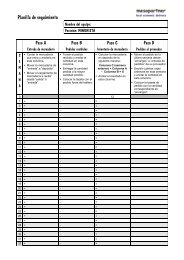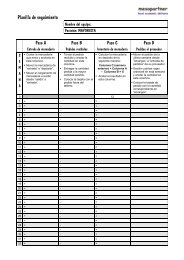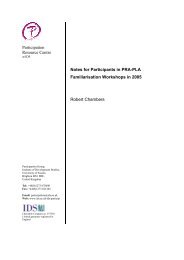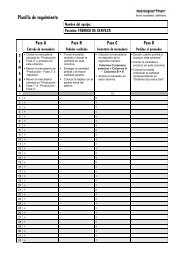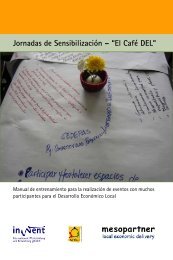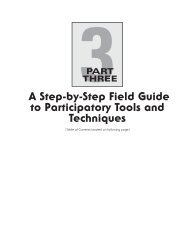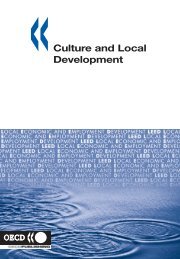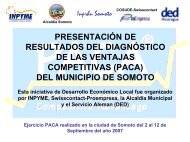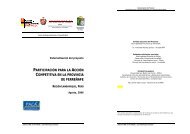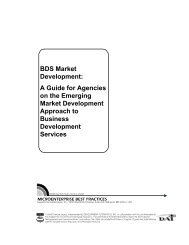McCormick+Schmitz Handbook for value chain research on - PACA
McCormick+Schmitz Handbook for value chain research on - PACA
McCormick+Schmitz Handbook for value chain research on - PACA
Create successful ePaper yourself
Turn your PDF publications into a flip-book with our unique Google optimized e-Paper software.
Box A.2: General rules <str<strong>on</strong>g>for</str<strong>on</strong>g> interviewing<br />
Appearance<br />
As a general rule, the interviewer should dress in a fashi<strong>on</strong> similar to that of the people he<br />
or she will be interviewing. Whatever the style of dressing, interviewers should be neat<br />
and well groomed.<br />
Demeanour<br />
Interviewers should be pleasant. They should introduce themselves, state the purpose of<br />
the <str<strong>on</strong>g>research</str<strong>on</strong>g>, and request an interview. If an interview takes place in the resp<strong>on</strong>dent’s<br />
place of business, the interviewer should make it very clear that the demands of the<br />
business take priority and that he/she is willing to wait and/or come back later. If a<br />
potential resp<strong>on</strong>dent is reluctant to be interviewed, the interviewer should try gentle<br />
persuasi<strong>on</strong>, but should never be demanding.<br />
Familiarity with questi<strong>on</strong>naire<br />
The interviewer must study the questi<strong>on</strong>naire very carefully, questi<strong>on</strong> by questi<strong>on</strong>, in<br />
order to become thoroughly familiar with it. Ultimately, the interviewer must be able to<br />
read the questi<strong>on</strong>naire items to resp<strong>on</strong>dents without error, without stumbling over words<br />
and phrases, and in as natural a manner as possible.<br />
Language<br />
If a questi<strong>on</strong>naire is to be administered in a language other than the <strong>on</strong>e it is written in, the<br />
<str<strong>on</strong>g>research</str<strong>on</strong>g>er and interviewers should discuss and agree <strong>on</strong> the translati<strong>on</strong>. It is especially<br />
important when there are multiple interviewers that all use the same wording in all<br />
versi<strong>on</strong>s.<br />
Following questi<strong>on</strong> wording<br />
Interviewers must resist the temptati<strong>on</strong> to rephrase questi<strong>on</strong>s in their own words. If the<br />
resp<strong>on</strong>dent clearly misunderstands the intent of a questi<strong>on</strong> or indicates that he/she does<br />
not understand, the interviewer may attempt to clarify. After the clarificati<strong>on</strong>, however,<br />
the interviewer should repeat the questi<strong>on</strong> as written.<br />
Recording resp<strong>on</strong>ses exactly<br />
Whenever the questi<strong>on</strong>naire c<strong>on</strong>tains open-ended questi<strong>on</strong>s, it is important that the<br />
interviewer record that answer exactly as given. No attempt should be made to<br />
summarise, paraphrase, or correct bad grammar.<br />
Probing <str<strong>on</strong>g>for</str<strong>on</strong>g> resp<strong>on</strong>ses<br />
Sometimes resp<strong>on</strong>dents will resp<strong>on</strong>d to a questi<strong>on</strong> with an inappropriate answer, or they<br />
will give a very short answer to an open-ended questi<strong>on</strong> that was seeking their opini<strong>on</strong>.<br />
When the reply is inappropriate, the interviewer may probe by repeating the original<br />
questi<strong>on</strong>. When the answer seems too short, the interviewer may ask questi<strong>on</strong>s like “How<br />
is that?” or “Can you add anything to that?”<br />
117



